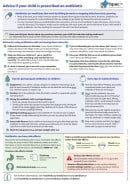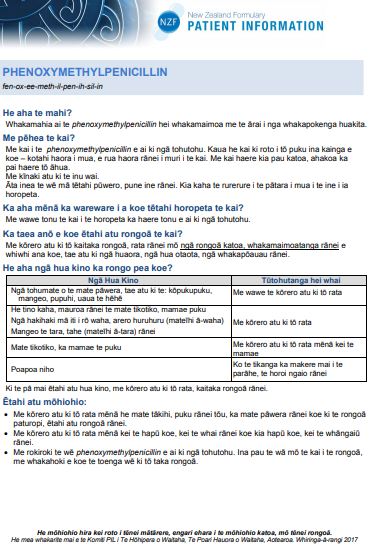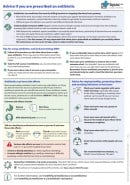You can now add Healthify as a preferred source on Google. Click here to see us when you search Google.
Penicillin V
Also called phenoxymethylpenicillin
Key points about penicillin V
- Penicillin V is an antibiotic used to treat different infections caused by bacteria.
- Penicillin V belongs to a group of antibiotics called penicillins.
- Penicillin V is also called phenoxymethylpenicillin.
- Find out how to take it safely and possible side effects.

Penicillin V is an antibiotic used to treat bacterial infections (eg, infections of the throat and chest) and skin infections (eg, cellulitis). It's also given to prevent infection if you've had rheumatic fever, or if you have a weakened immune system (eg, if you have had your spleen removed). Penicillin V works by killing or stopping the growth of bacteria (bugs). Like all antibiotics, penicillin V is not effective against infections caused by viruses.
Allergy to penicillin
Penicillin V belongs to a group of antibiotics called penicillins.
-
Before taking Penicillin V: Tell your healthcare provider if you have had an allergic reaction to a medicine, especially a penicillin antibiotic. True penicillin allergy is rare – fewer than 5 out of 10,000 people are allergic to penicillin. Most people who think they have a penicillin allergy do not – read more about penicillins and penicillin allergy(external link).
-
After taking Penicillin V: If you develop signs of an allergic reaction such as skin rash, itching, swelling of your lips, face and mouth, or difficulty breathing, stop taking Penicillin V and seek immediate medical attention.
Dose
In Aotearoa New Zealand, penicillin V is available as capsules and liquid.
- Always take your penicillin V exactly as your doctor has told you. The pharmacy label on your medicine will tell you how much to take, how often to take it, and any special instructions.
- The dose of penicillin V will be different for different people depending on the type of infection and your age.
- Adults: the usual dose is 500 mg 4 times a day. For a severe infection, you may need 1 gram 4 times a day.
- Children: the dose for children will depend on their body weight. It is usually given 2 to 4 times a day.
- Your doctor will advise you on how long to take penicillin V for. It is usually taken for 10 days, but some people require longer treatment.
How to take penicillin V
- Penicillin V is best taken 1 or 2 hours before eating food. This is because your body may absorb less penicillin V after a meal, making it less effective.
- Capsules: Swallow the capsule with a glass of water. Do not chew them.
- Liquid: Shake the medicine well. Measure the right amount using an oral syringe or medicine spoon. You can get these from your pharmacy. Do not use a kitchen spoon as it will not give you the right amount. Read more: Tips on how to give medicines to babies and children.
- Timing: Take penicillin V at the same times each day. Try to space your doses evenly throughout the day.
- Twice a day: This should be in the morning and in the evening.
- Three times a day: This should be in the morning, early afternoon and at bedtime.
- Four times a day: This should be about 4 hours apart, for example 7am, 11am, 3pm and 7pm.
- Missed dose: If you forget to take your dose at the correct time, take it as soon as you remember. Try to take the correct number of doses each day. Don't take 2 doses at the same time to make up for a forgotten dose.
- If you are sick: If you are sick (vomit) less than 30 minutes after having a dose of penicillin V, take the same dose again. But, if you are sick more than 30 minutes after taking your dose, you don't need to take another dose. Just take the next one when it's due. If you are vomiting and are worried, contact your doctor or call Healthline (0800 611 116) for advice.
- Finish the course: It's best to take the whole course of antibiotics for the number of days your doctor has told you to. Don't stop taking it, even if you feel your infection has cleared up.
Here are some things to know when you're taking penicillin V. Other things may be important as well, so ask your healthcare provider what you should know about.
Taking other medicines and supplements
- Penicillin V can interact with some medications, herbal supplements and rongoā Māori, so check with your doctor or pharmacist before starting penicillin V and before starting any new products.
- If you're taking the contraceptive pill, the effectiveness of ‘the pill’ can be reduced if you have a bout of being sick (vomiting) or diarrhoea which lasts for more than 24 hours. If this happens, ask your doctor or pharmacist for advice about contraception over the following few days.
Storage
Store your capsules in a cool, dry place, away from direct heat and light. If you have been given liquid medicine, this will have been made up by the pharmacy and you may need to keep it in the fridge – check the instructions on the bottle. Make sure the medicine doesn't freeze.
Like all medicines, penicillin V can cause side effects, although not everyone gets them. If you're concerned about any symptoms you think might be related to your medicine, talk to your healthcare provider. The following information offers some guidance but doesn't include all possible side effects.
Common side effects
Tell your healthcare provider if these side effects bother you.
- Nausea (feeling sick) or vomiting (being sick). Try taking your medicine with food. If you vomit less than 30 minutes after having a dose of penicillin V, take the same dose again. But, if you vomit more than 30 minutes after having a dose of penicillin V, you don't need to take another dose. Wait until the next normal dose. If you're also taking the oral contraceptive pill let your healthcare provider or pharmacist know.
- Diarrhoea (loose, watery stools/poo). Drink plenty of fluids such as water to avoid dehydration. Tell your healthcare provider if it becomes severe or contains blood. If you have diarrhoea and you’re also taking the oral contraceptive pill, let your healthcare provider or pharmacist know.
- Teeth staining from liquid penicillin V. This doesn't last and can be removed by brushing your teeth.
Ask your healthcare provider or pharmacist for advice or phone Healthline free on 0800 611 116 if these occur
- Small white patches in your mouth or a white furry tongue (oral thrush).
- Vaginal itching, soreness or discharge (vaginal thrush).
- Signs of being sensitive to the medicine such as rash, fever and joint pains.
Phone 111 for an ambulance or go to your nearest accident and emergency (A&E) clinic if these occur
- Signs of an allergic reaction such as itchy skin, and rash, swollen lips or tongue, problems breathing, like a tight chest or shortness of breath.
Read more about medicines and side effects and reporting a reaction you think might be a side effect.
For adults
Phenoxymethylpenicillin(external link) NZ Formulary Patient Information, NZ
Cilicaine VK®(external link) Medsafe Consumer Information, NZ
For children
Penicillin V for prevention of pneumococcal infection(external link) NZ Formulary for Children, NZ
Penicillin V for bacterial infections(external link) NZ Formulary for Children, NZ
Brochures
Advice if you are prescribed an antibiotic(external link) BPAC, NZ, 2024
Advice if your child is prescribed an antibiotic(external link) BPAC, NZ, 2024
Phenoxymethylpenicillin in te reo Māori(external link) My Medicines, NZ, 2017
References
- Phenoxymethylpenicillin(external link) NZ Formulary, May 2022
- Phenoxymethylpenicillin(external link) NZ Formulary for Children, May 2022
Brochures

Advice if your child is prescribed an antibiotic
BPAC, NZ, 2024

My Medicines, NZ, 2017
Credits: Healthify He Puna Waiora Pharmacists. Healthify is brought to you by Health Navigator Charitable Trust.
Reviewed by: Sandra Ponen, BPharm, MPH, Auckland
Last reviewed:
Page last updated:






